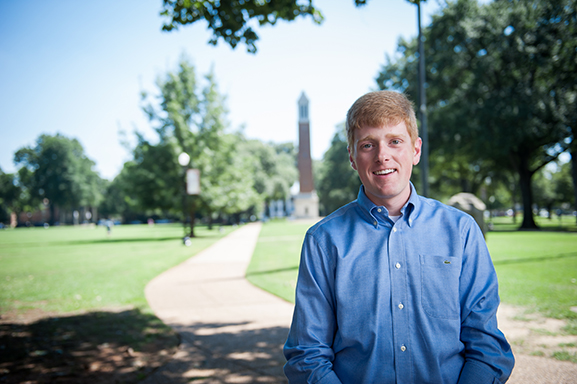
While hordes of pre-health students scramble to prepare for medical school interviews and perfect their already polished applications, a University of Alabama senior has taken a different approach to pursuing his passion for medicine. Brian McWilliams, though beginning his third year of college, will graduate this spring with a bachelor’s degree in biology. By the end of his fourth year he will receive his master’s in business administration. He also leads a student organization that ships medical supplies overseas and founded a nonprofit in high school that has raised $125,000 to date.
McWilliams says he hopes to end up somewhere “on the business side of medicine,” either in the field of health care policy or administration. Originally from Pittsburgh, Pennsylvania, he chose to attend The University of Alabama because of its honors programs, streamlined application process for science students interested in pursuing graduate business degrees, and resources available to undergraduates, of which he has taken full advantage. He is a member of the University Fellows Experience, works in Dr. Matthew Jenny’s research lab, and was named the winner of the University’s John Fraser Ramsey Award this year, which includes a nearly month-long trip to Europe and a $3,000 stipend that he will use toward his graduate degree.
McWilliams’ interest in medicine stems from his interest in science and the extensive impact of disease and health care.
“When I think about health care, I think about how necessary it is,” he said. “Everyone is on the same level in terms of disease, because no one is completely immune from that.”
McWilliams said his interest in health care is as much about the application and distribution of health care as it is about the actual practice and day-to-day interaction with patients. He is particularly interested in disparities that exist in health care availability.
“I like to read a lot of about health care disparities and learn about what’s being done – and what could be done in the future – to mitigate them,” he said.
But he hasn’t just read about health care disparities. He’s acted upon them.
In high school, McWilliams was inspired by a 4-year-old boy, Alex, who showed that diseases can affect anyone at any time and for any reason. Alex developed a mass of blood vessels around his spine, and when doctors tried to remove the mass surgically, he became paralyzed from the waist down. Alex spent four months in the pediatric intensive care unit and another four months in an inpatient rehabilitation facility before needing more surgeries and experiencing complications as varied as swine flu and collapsed lungs.
“He kept pushing through, and I thought, ‘If this kid is doing this much to help himself, there must be something I can do,’” McWilliams said.
McWilliams started the Team Alex Fund, which initially raised $30,000 for Alex and his family through a 5K race with more than 800 runners. McWilliams has since turned the one-time fundraiser into an established nonprofit.
“After the first year, the family shared with me how much they appreciated the fundraiser and how often they had met other families in similar situations who didn’t have the same kind of community support,” McWilliams said. “I wanted to be able to make those kids’ lives easier, too. We held our fifth annual race this year and have raised $125,000 for children with spinal cord injuries since the organization started.”
The Team Alex Fund provides therapy and mobility equipment not covered by insurance and has funded everything from $100 shower chairs to $15,000 bikes with electrodes that stimulate the spinal cord.
Though McWilliams doesn’t take the same hands-on approach as he did when the organization started, he still serves as chair of the board of directors.
“We just received an application for a child in Puerto Rico, so I was pretty excited to see that our reach was able to extend that far,” he said.
At UA, he leads another organization with the same mission of providing medical services to people who might not otherwise receive them. As co-president of Alabama Advocates for World Health, he leads a team that collects medical supplies to send to clinics in third world countries.
“Local hospitals discard supplies when their expiration dates have passed, according to guidelines set by the U.S. Food and Drug Administration,” he said. “But many of the products are still usable and will last at least six months to a year and a half before the manufacturing dates expire. It’s a great opportunity for overseas clinics with limited funding and less strict guidelines.”
This summer, McWilliams employed the skills he’s learned as an undergraduate researcher to impact patients in yet another way. As a research intern at the University of Pittsburgh Medical Center, he investigated cases of ultramassive blood transfusions, in which patients receive 20 or more units of blood in a day. McWilliams examined daily the amount of blood the patients received the week following the ultramassive transfusion, and he compared the amount of blood the patients received to their recovery time. The results of McWilliams’ study will be combined with results from similar studies occurring in 13 countries and 30 hospitals worldwide.
“The data will be used to determine whether giving patients more blood yields better outcomes and fosters more healing,” he said.
With two years of undergraduate and graduation education still ahead of him, McWilliams is unsure of what will await him next.
“I think medical school is the next logical step for me, but I’m not exactly sure,” he said. “I could also see myself working for a pharmaceutical company or a hospital. I also wouldn’t be doing this much research if I didn’t plan on it playing some sort of role in the future.”